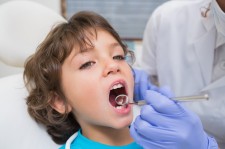
While narrow arches are often implicated in sleep apnea problems, breathing problems may be the cause of narrow arches in the first place. Sacramento Dentistry Group examines the factors linked to mouth breathing that are cited as causing improper arch development when people are youngsters. Narrow arches can be corrected by orthodontics.
Sacramento, CA, June 22, 2016 (Newswire.com) - The shape of the maxillary arch is increasingly studied to examine the relationship between the width of the upper jaw and the risk of problems with breathing, such as obstructive sleep apnea. While it is generally accepted that a narrow arch is a potential factor for sleep apnea, many dental scientists also investigate the possibility that childhood breathing problems lead to narrow arches in the first place! Thus, taking steps to help a child breathe through the nose, and not the mouth, are possibly very important to encouraging proper dental growth.
Two Factors Involved
A review in the European Journal of Dentistry explained two factors suggested by researchers that may be involved in improper maxillary development. (The mandibular arch is found in the lower jaw, the maxillary arch in the upper.) First, breathing through the nose is believed to actually encourage the proper growth of the upper jaw. Part of the mechanism for this theory may be that oral breathing, instead of nasal breathing, tends to lower the tongue in the mouth. This constant position of the tongue is thought to “impede the…development of the maxilla.”
As the Sacramento Dentistry Group has discussed in a prior article pointing out the link between sleep apnea and bruxism, the shape of the maxillary arch directly affects the amount of air available to a patient when they breathe. While orthodontics can improve both the shape of the arches and the breathing function of Sacramento dental clients, perhaps directed medical treatment when people are young may eliminate the need for braces, Invisalign or similar procedures as they grow older.
The dentists at the Sacramento Dentistry Group are available to help assess your maxillary arch and overall bite to determine if it might be impeding your ability to breathe clearly. Readers can learn more at sacramentodentistry.com or by contacting them directly at 916-538-6900.
Source: Sacramento Dentistry Group
Share:
